Let’s toss out technology and talk media
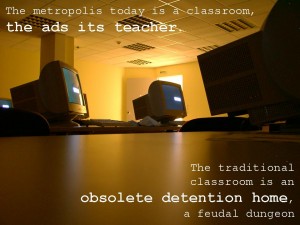 I’ve been following the various ELT blog posts on technology the past few months. Quite aghast at the level of a) fear about technology b) misconception about what “tech” is c) belief that technology is either good or bad.
I’ve been following the various ELT blog posts on technology the past few months. Quite aghast at the level of a) fear about technology b) misconception about what “tech” is c) belief that technology is either good or bad.
What I would propose is that a lot of our problem talking about the use of technology in our teaching (in and outside of the classroom) stems from the word itself. It is too much, too all encompassing, too bla and boring. We need something sharper and more cutting – like the word and idea of “media” as coined and used by McCluhan.
McCluhan I’ve read and followed and chewed and sucked upon like a lemon drop, for years. He’s a colossus and even more relevant as each day goes by. He used both terms interchangeably but if you read them in context, clearly McCluhan thought of “media” as an extension of man and technology as something static and deterministic. I think in education, we are clearly talking about “media” not technology. We are shaped by our tools as McCluhan suggests – they are more than just a means of determining an outcome.
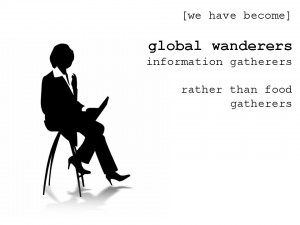 So let’s mediate and think of our technology as “media” and something that facilitates communication across time, space and mind. What are the ramifications of a particular media? What makes one thing “good” for teaching and another “bad”? How should we judge whether voice translators are a great tool or just a passing fad?
So let’s mediate and think of our technology as “media” and something that facilitates communication across time, space and mind. What are the ramifications of a particular media? What makes one thing “good” for teaching and another “bad”? How should we judge whether voice translators are a great tool or just a passing fad?
I think in this respect, we should turn to McCluhan’s 4 laws of media. Laws by which we can judge media at any time. Each media has 4 essential traits, laws by which they operate. Media can:
Enhance. For example the internet accelerates the speed by which we can retrieve data and obtain information (communicate)
Reverse. For example the internet originally was a way to share scientific information and form community over vast distances. Now we see how as it “webs” out, community erodes and we get individuals estranged and alone online amid the noise and abundance.
Retrieve. For example the internet brought back “crowd sourcing” and groups of people pooling their labor, knowledge and time to create value. Like the old “barn building bees”. McLuhan was right, we now in many ways live in a village but a village with a big screen to the outside.
Obsolesce. If video killed the radio (kinda), then the internet is pushing aside the library and traditional sources of knowledge (like elders, like teachers).
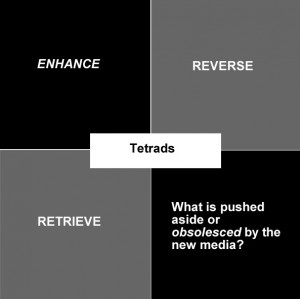
The tetrad holds true for any kind of media you evaluate it with. It is a great tool for clearly seeing the place, worth and potential (minus/plus) of a tool / technology. I challenge you – put in something new like a cell phone or computer labs or ebooks or printers. You can tetrad it and come up with a pretty good analysis of the media.
This is not to say that you can ever come to the conclusion that some media is “good” or “white” and another “bad” or “black”. It is all in the nuance and how it is used. The media change us, our view of the world and importance of it – much more than we ever can control.
McCluhan means the world to me. Without him, I don’t think I’d of ever of become interested in how we “mean”, interested in semiotics and signs/symbols. He voiced so much I felt in my heart. I remember spending a whole day reading The Gutenberg Galaxy in a second-hand bookstore and missing my bus – having to sleep outside on a bench until 11pm, dreams of his staccato, confusing but clairvoyant sentences dancing in my dizzy head.
Let me end with a few quotes that pertain to technology or media. Some more lemon drops for us to suck upon. Also, highly recommend this recent podcast about technology and these 4 laws of media.
“All media are extensions of some human faculty- psychic or physical” (meaning, like most would suggest, the media themselves are neutral but not what they do to the environment).
“The artist (or maybe technology teacher, my italics) is the person who invents the means to bridge between biological inheritance and the environments created by technological innovation.”
“It is the framework which changes with each new technology and not just the picture within the frame.” (why technology now is so disruptive to education and “what is a school?”)
“As technology advances, it reverses the characteristics of every situation again and again. The age of automation is going to be the age of “do it yourself“.” (for teaching meaning a return to self-directed learning).


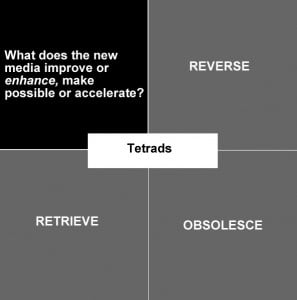


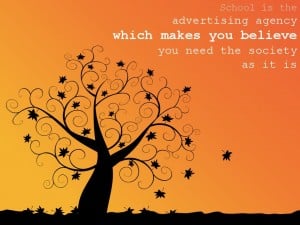









Reader’s Comments